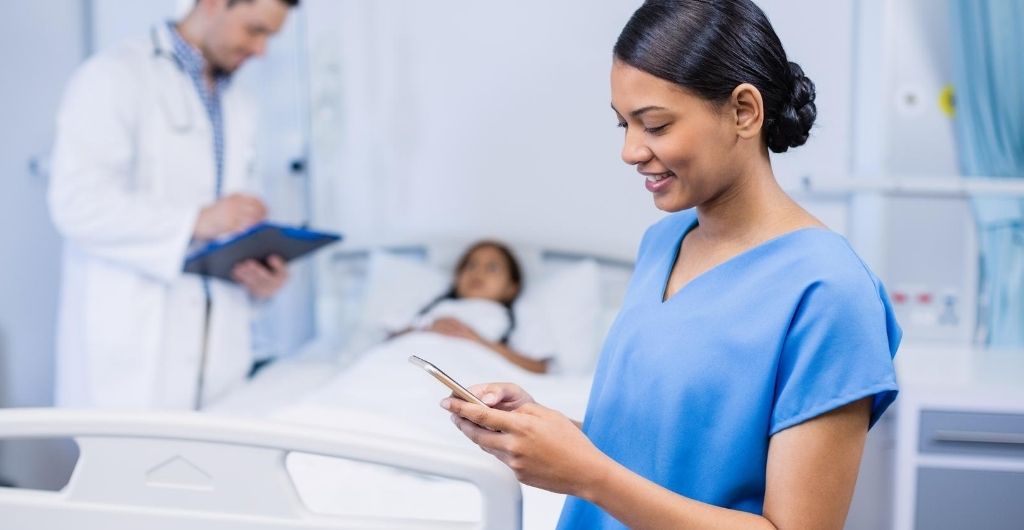
By Sharon Hargreaves, CCIO at Southern Health Foundation Trust.
Like many trusts across the UK, Southern Health NHS Foundation Trust found itself with an increase in demand due to Covid-19, and we needed a solution to help us manage clinical care more effectively while keeping our staff safe.
We’ve never been averse to implementing new technologies that will improve efficiencies for our staff. Before Covid-19, our Trust already had a long term digital improvement strategy in place in accordance with the NHS Long Term plan, which calls for NHS Trusts to have better access to digital tools and patient records for staff. There is also a requirement in the plan for including improvements to the planning and delivery of services based on the analysis of patient and population data.
With over 500 community physical health staff working at Southern Health, we had been planning for some time to find a new way to securely access and capture information at the point of care. Staff were already using an electronic system and had laptops, but some staff reported finding these cumbersome to use in patient homes. This meant staff did not have the patient’s history to hand at point of contact, frequently use other methods to take notes, then return to base to enter the information in the EPR.
When Covid-19 hit the UK it became essential that we responded immediately and the priority for the Trust was preparation. We needed to find suitable ways to enable staff to respond quickly with reduced record keeping and mobile working and it became glaringly obvious that we needed this mobile solution sooner than we had originally anticipated.
The solution we chose was Rio Mobilise created by Servelec and Totalmobile. It includes an app that allows staff at Southern Health NHS Foundation Trust to access Rio, Servelec’s EPR system anywhere, recording updates in real-time and allowing staff to collaborate on work no matter if they are at home or in the office.
When we first approached Servelec and Totalmobile it seemed like a logical choice for us, we already use the Rio EPR and it integrates with this directly. But the element that was now critical to us was the rate at which the solution could be deployed, and there was no disappointment on that front.
Initially, in response to the Coronavirus, we were looking at accelerating the implementation by a few weeks. However, by working to that timescale it was looking like we would be hitting the peak of the virus ahead of this. Both companies were incredibly responsive and by working together we managed to implement the mobile solution in just six days.
The solution has multiple benefits; visits can be downloaded prior to the working day, providing community nurses with maps so that they can easily navigate to unknown addresses; information is readily available at a touch, such as the phone number to dial ahead if required as well as demographics of the patient and care summary; alerts and the last five progress notes are all available to view prior to visit.
Once the community worker is in the patient’s home, they can carry out an assessment without being connected to the internet and create a care plan with the patient. Once reconnected to the Internet, all the information goes back into the main Rio record for others to view. The amount of time this saves staff is phenomenal, but the process also benefits patients as more time is freed up for nurses to focus on the individual during visits.
The number of staff using this solution continues to grow across Southern Health. We recently undertook a staff survey and the feedback has been overwhelmingly positive. Describing the app as ‘easy’ and ‘intuitive’ feedback from users included, “I find it quick and easy to write my notes and outcome my visits.”
Perhaps the most glowing report was from a community nurse commenting that, “As a newly registered member of staff it’s really helped me to feel confident when I double-check patient information when I’m in a patient’s home. It’s also given me more capacity in the afternoon, rather than spending large amounts of time typing out notes. I’d encourage all community teams to use this.”
Patient feedback to the app has also been really positive with patients reporting that they feel more confident that their care is focused on them. They find it helpful that information can be added to their records in real time so they have more trust in the service, feeling confident that nothing will be forgotten.
It’s feedback like this that encourages our digital journey at Southern Health. Providing confidence for our staff to provide better patient care is always essential, but particularly when there’s an increase in demand on the service.
Our mobile devices have become an extension of everything we do in everyday life, and now it’s great seeing them used in such a positive way to help deliver better care. Perhaps the circumstances under which the solution was deployed weren’t ideal, but once things begin to return to some sense of normality, the long-term benefits of a robust mobile solution will long outweigh the negatives. We hope it will be used for years to come to improve day-to-day care for our patients and improve their experience using our service.








